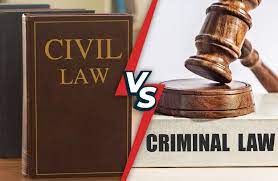Introduction
In the realm of legal systems, the distinction between criminal law and civil law holds paramount significance. Understanding the fundamental differences between these branches is crucial for navigating the complexities of the legal landscape. Let’s delve into the origins, nature, and key differentiation of criminal law and civil law.
Nature and Purpose of Criminal Law
Substantive Focus of Criminal Law
Criminal law pertains to offenses against the state, emphasizing societal norms and public order. It defines crimes, such as theft, assault, and murder, and outlines penalties for offenders. The prosecution, representing the state, seeks to hold perpetrators accountable and safeguard public safety.
Procedural Elements in Criminal Cases
In criminal proceedings, the burden of proof lies with the prosecution, which must establish guilt beyond a reasonable doubt. Defendants enjoy constitutional rights, including the right to counsel, presumption of innocence, and protection against self-incrimination. The adversarial nature of criminal trials involves the clash between prosecution and defense, with the aim of delivering justice.
Examples of Criminal Cases and Penalties
Cases involving criminal law encompass a broad spectrum, from petty theft to heinous crimes. Penalties vary depending on the severity of the offense, ranging from fines and probation to imprisonment and, in extreme cases, capital punishment. The criminal justice system seeks to deter unlawful behavior, punish wrongdoers, and rehabilitate offenders.
Characteristics of Civil Law
Scope and Scope of Civil Law
Civil law addresses disputes between individuals or entities, focusing on private rights and responsibilities. It aims to provide compensation and remedies for harm suffered by plaintiffs due to the actions or negligence of defendants. Civil liability arises from breaches of legal duties, such as contractual obligations or tortious conduct.
Legal Principles in Civil Cases
In civil cases, the preponderance of evidence standard applies, requiring plaintiffs to prove their claims by a greater weight of evidence than the opposing party. Civil courts, presided over by judges, adjudicate disputes and render judgments based on applicable laws and legal principles. Civil procedure governs the litigation process, including pleadings, discovery, and trial proceedings.
Examples of Civil Cases and Resolutions
Civil litigation encompasses diverse matters, including personal injury claims, contract disputes, and family law matters. Resolutions may involve monetary damages, injunctions, or specific performance orders to compel or prohibit certain actions. Civil law aims to restore injured parties to their pre-damage state and uphold legal rights and obligations.
Key Differences between Criminal and Civil Law
Nature of Parties Involved
In criminal law, the state acts as the prosecuting party, representing public interests and enforcing laws. In contrast, civil cases involve disputes between private individuals or entities, with plaintiffs seeking redress for harm suffered.
Legal Standards and Burdens of Proof
Criminal cases require proof beyond a reasonable doubt to secure convictions, reflecting the gravity of criminal charges and the liberty interests at stake. Civil cases employ the preponderance of evidence standard, which requires plaintiffs to demonstrate that their claims are more likely true than not.
Goals and Outcomes of Legal Proceedings
Criminal law aims to punish offenders, deter criminal behavior, and protect societal interests in maintaining order and safety. Civil law seeks to compensate injured parties, resolve disputes, and uphold individual rights and legal obligations.
Conclusion
In summary, the dichotomy between criminal law and civil law underscores the multifaceted nature of legal systems. A nuanced understanding of their differences is essential for legal literacy and informed decision-making. By grasping the distinct roles, principles, and outcomes of criminal and civil law, individuals can navigate legal challenges and contribute to a just and equitable society.


